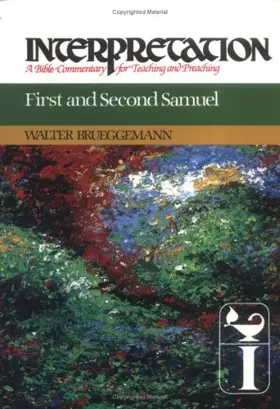

First and Second Samuel
Pages
362
Publisher
Westminster John Knox
Published
1/1/1990
ISBN-13
9780804231084
Reviews
Helpful at times but also aggravating at times. Though it can be helpful to try to discern the narrator's intentions and ways of telling the story compared to “what actually happened”, Brueggemann throws in a lot of his cynicism which leads to the impression we should not trust the narrator. Brueggemann constantly tells us “the real motivations of David.” The constant cynicism will wear you down and make one feel like the real hero is Brueggemann himself who sits above all this in his great wisdom. Eventually I became weary and cynical of Breuggemann himself.
That this commentary is so low rated here is almost criminal. This is a brilliant piece of writing. Brueggemann comes from a less conservative position, which might put off some evangelicals. But this commentary shows the brilliance of Brueggemann. He captures the artistry of the narrative beautifully. He unveils the complexity of the characters and the mysterious divine presence throughout.
A helpful commentary from a moderate perspective. Like his Interpretation commentary on Genesis, Brueggemann refuses to get bogged down with historical questions, and instead brings his insight into the theological realm. He effectively paints a picture of a Davidic Israel, and demonstrates God's unmitigated hesed towards the house of David. Particularly insightful is his analysis of 2 Samuel 7: "The plushness of the proposed temple contradicts Yahweh's self-understanding. Yahweh will not be bought off, controlled, or domesticated by such luxury. Yahweh has been a free God and will continue to be. The royal apparatus is not able to make Yahweh its patron" (254).
As the Dallas Seminary has touched upon, Brueggemann comes from a 'skeptical' background. I found him to not drive deep enough into the text which is likely because of his supposed neutral theological position between 'fideism' and 'skepticism.' (self proclaimed in his 'Theology of the OT') He rattles on consistently that the books of Samuel are propaganda to support a violent and subversive king in David. He is adament that David stole the kingship from Saul. I found such assumptions difficult to resolve in light of his supposed 'Biblical Theology' position. I often thought to myself: "Where is the evidence to support your ideas Walter?"
If you want a commentary that is not your typical 'run of the mill' 'evangelical,' then this is the one to purchase. In my opinion Tsumura 'owns' him as well as the other works that are available. I look forward to Tsumura's NICOT on 2 Samuel! If you can get only one commentary on 1 Samuel be sure to purchase Tsumura.
Walter Brueggemann's Interpretation (1990) is one of the best in the series. It's written on the popular level and is thus very easy to read, but it's not lightweight in terms of the level of reflection. Brueggemann is very observant on matters of structure and literary characteristics, a weakness in many of the other commentaries. He also asks provocative questions to move us away from our cultural assumptions and theologically safe positions. Three key themes are socio-political analysis, David as a person, and the work of God in history. Sometimes his insightful thinking can move into unhelpful speculation, but often it's thought-provoking and imaginative in the good sense of trying to reconstruct what's likely to have been going on in the background that the text doesn't explicitly say.
Sometimes he moves in directions I would ultimately want to resist (e.g. he thinks the final editors are unfair to Saul and oversimply the socio-political realities they describe, he sometimes will criticize things the text describes as being in God's will, and he sees the murder of Uriah as typical of David's abuse of power rather than exceptional), but it's always worth thinking through why it's worth resisting and why his suggestions are wrongheaded. This commentary is very light on historical background in favor or ideological, theological, and literary matters
[Full Review]
Focus on text as literature (vs. historical questions) to probe how its ideology impacts human experience.
[Full Review]




